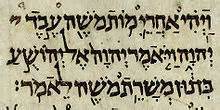"They Made Confession and Worshiped the Lord" -- Nehemiah 9
 Tuesday, February 7, 2017 at 08:21AM
Tuesday, February 7, 2017 at 08:21AM  The Eighteenth in a Series of Sermons on Ezra-Nehemiah
The Eighteenth in a Series of Sermons on Ezra-Nehemiah
In Nehemiah chapters 8-10 we read of a dramatic covenant renewal ceremony which took place in Jerusalem, shortly after the people of Israel had completed the arduous task of rebuilding Jerusalem’s walls and gates. In chapter 8:4-9, Nehemiah recounts the reading of Book of the Law to the people of Israel by Ezra, as well as a second reading of the law which followed shortly after (Nehemiah 8:12). After the law was read again the people of Israel celebrated the Feast of Tabernacles with renewed faith and zeal, this time as prescribed in the word of God, complete with the building of shelters and tents recounting Israel’s time of sojourn in the wilderness exactly as prescribed in God’s word. A reformation was occurring within Israel–brought about by the Holy Spirit through the sustained reading and studying of God’s word.
According to Nehemiah 8:9, when the law was read the people of Israel who assembled outside the Water Gate were overcome with emotion and wept–this was certainly understandable. This was after all a remarkable day in Israel’s history because the people present were former exiles who returned to the land after their forbears came under God’s covenant curse because of their prolonged disobedience. On this day, they were celebrating the fact that Jerusalem’s walls were finally rebuilt and the city could now return to its former glory. Add to this the fact that the demands of the law expose the depths of our sin and reminds us how deeply sin resides within each of us. There were good reasons to weep.
But this was not to be a day of weeping. With the support of the Levites, Nehemiah exhorted the people to rejoice, because on this day God’s law was read and the people understood it as it was expounded and explained to them. The people heard the account of YHWH’s mighty acts of redemption in creating the nation of Israel as his own covenant people, and as a consequence, the people’s sorrow now turned to joy. This joy, in turn, became the basis for a renewed celebration of the Feast of Tabernacles. And it is the conclusion of the feast which sets the stage for the scene described in Nehemiah chapter 9. This fits Nehemiah’s larger purpose in recounting that the reading of Scripture leads to true joy and creates a renewed strength in the Lord, as well as leading to the recovery of biblical practice. This sets the stage for the covenant renewal ceremony recounted in chapter 10. Before the covenant renewal ceremony takes place, the people of Israel become overwhelmed with the guilt of their collective sin, which they confess before YHWH–the theme of Nehemiah 9.
As we turn to our text, the entire 9th chapter of Nehemiah (so you will need to have your Bibles handy), the law will be read for the third time (9:3), and is then followed by a lengthy prayer of confession–which runs from the last part of verse 5 through to the end of verse 37. The prayer and recounting of YHWH’s mighty acts in redeeming his people sets the stage for the renewal of Israel’s covenant with YHWH as recounted in the next chapter.
To read the rest of this sermon, Click Here


Reader Comments (2)
I was wondering if you could answer or direct me to a simple explaination or answer to a simple guideline, on when to take Scripture either literally or symbolically. I believe that much of end time literature (e.g. Revelation), is symbolic in nature. But there are many who attempt to interpret it in a figurative way.
Some will say we take the 6 days of creation as literally and yet in Rev., 42 months is taken symbolically as the entire time from Christ's first and second coming.
One thing you can do is read a good hermeneutics text like Beale's Handbook on the New Testament use of the Old Testament (Baker), or Graeme Goldsworthy's Christ-Centered Biblical Theology (IVP). You might also find Geerhardus Vos' Biblical Theology helpful in this regard.
KR